Created by Pendleton Ward, creator of Adventure Time, it shares a number of similarities with its older sibling in terms of animation style, irreverent surreal humour that specializes in funny wordplay, a fantastical backdrop of weird mythical creatures, and a child-like whimsy that masks some adult dramatic undertones.
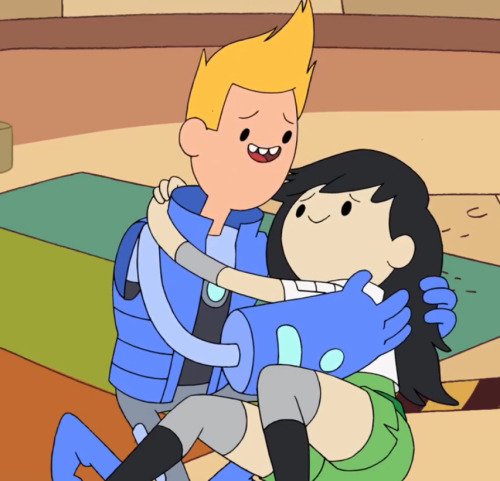 |
| Also the main character is a skinny blonde dude who's in love with a girl who likes him too but they can't admit it to each other because of reasons. |
But unlike Adventure Time, Bravest Warriors is set in space! So, if the former is a gloriously fun take on fantasy elements with mystic swords, magic, and heroes saving princesses and going on quests, you could say the later is the sci-fi version of that. But you know, with activated sticker swords, futuristic technology, and heroes saving alien races and going on missions.
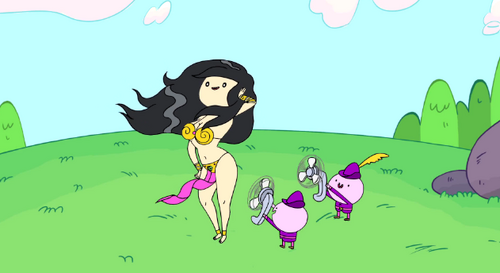 |
| And like all true sci-fi referential shows, a female character appears in a slave Leia bikini outfit. |
However, Bravest Warriors is more than just quirky sci-fi cartoon on the internet made by that guy who does that other quirky fantasy cartoon on television, it's kinda like a microcosm of a whole generation distilled into five minute episodes of wacky offbeat animation.
For when you break down the various elements of Bravest Warriors, it kinda starts to reflect the attitudes and sensibility of a generation, all thrown together in a Holo John of science fiction tropes, video game logic, Nintendo love, Saturday morning cartoons, and absurdest humour that appears childish but is actually only really funny to twenty-somethings who get the nods and winks. Not to mention post-post-ironic love of stuff,
 |
| Here Marten from Questionable Content helpfully explains what is meant by post-post-ironic. |
And it is this post-post-ironic love of stuff that is key, because it is this gleeful sincerity that permeates all over Bravest Warriors, filling it up like it's one with Wankershim. Everything in Bravest Warriors is done with utmost sincerity even when it seems like it must be ironic because how can you end an episode with 500 chocolate puppies appearing out of nowhere and have a character declare it is the best day of his life without winking at the audience?
To be fair, it would have been hard for him to wink considering they had just removed his eyelids...
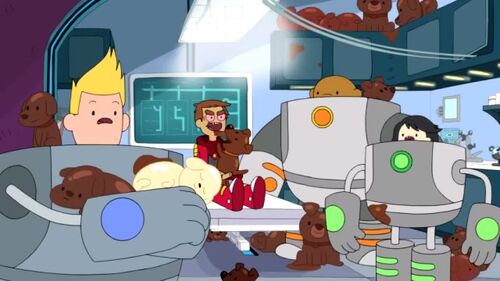 |
| In case you can't tell, he's the one on the operating table and big pink eyes. |
But this gleeful sincerity makes perfect sense in the context of the internet generation (for lack of a better term, although I guess some people use 'millenials'). No, seriously. On the internet we are encouraged to unabashedly love things deemed childish or uncool with no trace of irony. Or maybe with some irony, but honestly it becomes hard to distinguish between loving something ironically so much that you kinda genuinely love it, and just straight out loving something despite the fact it might be completely ridiculous or even embarrassing to watch.
And this post-post-irony comes about because it's so hard to tell what is even ironic anymore. It's like sarcasm in the nineties, people were being ironic all the time dismissing things they didn't like with sarcastic comments such that it kinda became difficult to tell if they were actually enjoying things or just be sarcastic. Like most things from the nineties, there is a handy Simpsons clip available that deconstructs what I'm talking about while also serving as an example.
For the nineties were a seriously ironic time. Not only did sarcasm run rampant, causing mayhem and feigned interest everywhere, but songwriters like Beck spat out nonsensical yet seemingly heartfelt lyrics in a detached tone leaving people puzzling over his sincerity. One of Blur's biggest songs, and definitely the song they're known for in the U.S., is "Song 2", a purposefully ironic parody of grunge rock. Yet it was loved non-ironically by those same grunge fans the song was making fun of, because by that stage who could tell what was ironic anymore?
In that context, it's no wonder Alanis Morrissette seems to have no idea what makes something ironic in her feelgood classic song "Ironic" but then again maybe she does. No one seems to know what irony even is, and that's the point.
Because by the time we get to the 2010s, people have kinda stopped being ironic. Or are so post-ironic, they're post-post-ironic and just love things with no shame or sense of irony. This doesn't mean there isn't sarcasm, or even irony, online. There is, and lots of it. But where Generation X, as they were known, seemingly faced the world with jaded sarcasm, millenials seem to approach a lot of things with a strangely non-sarcastic gleeful sincerity.
Think of the internet's odd fascination with bacon.
Before anyone gets the wrong idea, I like bacon. Bacon is delicious and a welcome addition to nearly any meal. But that's the thing, it's just an addition. Bacon is never, or rather, should never, be the entirety of one's meal. It's that little extra something that makes the meal a little bit more special. Bacon and eggs without bacon is just eggs, and while eggs are great, there is something lacking when they're hanging by themselves. It will fill you up and even taste amazing, but it's lacking that something extra (bacon, the something extra is bacon).
But look at that picture above. It's a mosaic... made out of bacon. Someone took the time to not only cook all those strips of bacon, but arrange them such that they made the image of an actor whose most famous for his loose feet and having bacon as his last name.
And that's not one isolated example of bacon obsession, there are literally entire sites whose sole purpose revolves around bacon, from offering countless bacon recipes, puting a rasher of bacon on your screen when you view a webpage, or where you can purchase bacon perfume. This is in addition to lists like this one of why bacon is awesome or this Oatmeal comic about why bacon is better than true love. Sure, the Oatmeal one might be a tongue-in-cheek, but it's picking up on the fact that the internet loves bacon.
I'm not even going to start on the internet's love of cats, for cats begath the internet and it is not wise to upset them, lest you feel their wrath.
How this internet bacon cat tangent relates to Bravest Warriors is it provides context for the show's post-post-ironic love of stuff.
But moving past post-post-irony, I've mentioned quite a lot that this show is a Holo John of various elements of pop culture. That's just like the internet, right? Where everything is thrown together in this interwoven fabric of references.
 |
| Why yes, that is a mosaic of actor Kevin Bacon made out of bacon that I found in a Google image search for the word 'bacon'. Why do you ask? |
Before anyone gets the wrong idea, I like bacon. Bacon is delicious and a welcome addition to nearly any meal. But that's the thing, it's just an addition. Bacon is never, or rather, should never, be the entirety of one's meal. It's that little extra something that makes the meal a little bit more special. Bacon and eggs without bacon is just eggs, and while eggs are great, there is something lacking when they're hanging by themselves. It will fill you up and even taste amazing, but it's lacking that something extra (bacon, the something extra is bacon).
But look at that picture above. It's a mosaic... made out of bacon. Someone took the time to not only cook all those strips of bacon, but arrange them such that they made the image of an actor whose most famous for his loose feet and having bacon as his last name.
And that's not one isolated example of bacon obsession, there are literally entire sites whose sole purpose revolves around bacon, from offering countless bacon recipes, puting a rasher of bacon on your screen when you view a webpage, or where you can purchase bacon perfume. This is in addition to lists like this one of why bacon is awesome or this Oatmeal comic about why bacon is better than true love. Sure, the Oatmeal one might be a tongue-in-cheek, but it's picking up on the fact that the internet loves bacon.
I'm not even going to start on the internet's love of cats, for cats begath the internet and it is not wise to upset them, lest you feel their wrath.
 |
| I'm just going to leave this up here to appease the lolcat gods. |
How this internet bacon cat tangent relates to Bravest Warriors is it provides context for the show's post-post-ironic love of stuff.
But moving past post-post-irony, I've mentioned quite a lot that this show is a Holo John of various elements of pop culture. That's just like the internet, right? Where everything is thrown together in this interwoven fabric of references.
For example, the show uses 8 bit sound bytes as music for its soundtrack, adding a tinge of nostalgia to a whole generation for whom those Nintendo sounds were the nursery rhymes of their youth. However, Bravest Warriors doesn't draw attention to that fact as a point of 'spot the reference' or geek cred, rather it's woven into the fabric of the show, part of its DNA in the same way those sounds are an intrinsic part of many a childhood.
In this way, it's quite similar to Scott Pilgrim, a film built for a generation raised on sitcoms, comic books, cartoons and Nintendo games. Bravest Warriors is similarly steeped in the literature of geek culture, just with a focus on sci-fi.
But Bravest Warriors is more than simply a quirky referential cartoon that appeals to people of a certain age and background because it draws on the appropriate literature and pop cultural touchstones they grew up with. Indeed, like Scott Pilgrim it is an embodiment of the biggest challenge that generation has to face: growing old.
Note, that is not the same as growing up. Growing up has connotations of putting away childish things and becoming an adult. But once we have came into our own, the millenial generation, as we're called by newspapers who have to give us some name or other, realised that being an adult doesn't mean you can't love the things you did as a child. Rather, you can appreciate them more. And not purely out of nostalgia, but because those things are the things you enjoy, so why shouldn't you enjoy them as an adult? Because they're not appropriate?
And so, we never let go of the childish things we loved, not because we didn't want grow up and become boring, although there is a bit of that, but because we didn't see why growing up meant letting go of the things you loved as a child. You can be a responsible fully functioning adult and still love comics or watch cartoons. The two things aren't mutually exclusive.
But since we're now adults, eventually the previous generation will be gone, and then we'll be where they are now and that's what Bravest Warriors kinda really is about. What happens when we have to be the grown ups after our parents are gone? That's how Bravest Warriors opens, with the gang's parents were all sucked up into the See-Through Zone, so they have to take on the role of the universe's mightiest heroes.
It's about the Nintendo generation learning to accept adult responsibility while still retaining their child-like enthusiasm for the things of their youth. And while we may be afraid of growing old, like the way Chris Kirkman dislikes his future self and doesn't want to accept that Emotion Lord is really him from the future,
We have to accept baldness as something that was always going to happen when your maternal grandfather was bald and your father is bald, and that it's okay we're getting older.
In this way, it's quite similar to Scott Pilgrim, a film built for a generation raised on sitcoms, comic books, cartoons and Nintendo games. Bravest Warriors is similarly steeped in the literature of geek culture, just with a focus on sci-fi.
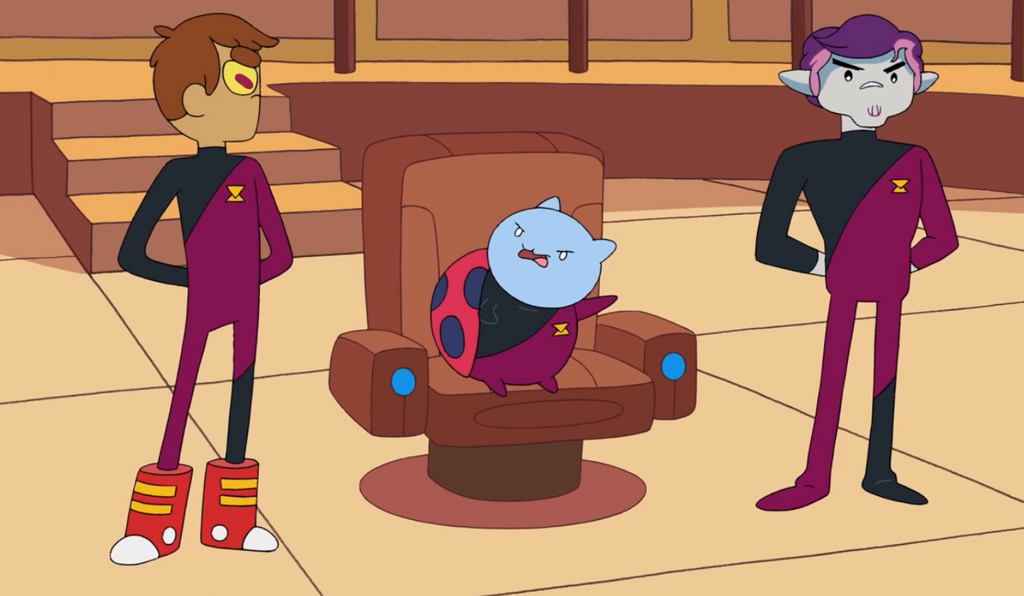 |
| And fittingly has a Star Trek: The Next Generation tribute episode. |
But Bravest Warriors is more than simply a quirky referential cartoon that appeals to people of a certain age and background because it draws on the appropriate literature and pop cultural touchstones they grew up with. Indeed, like Scott Pilgrim it is an embodiment of the biggest challenge that generation has to face: growing old.
Note, that is not the same as growing up. Growing up has connotations of putting away childish things and becoming an adult. But once we have came into our own, the millenial generation, as we're called by newspapers who have to give us some name or other, realised that being an adult doesn't mean you can't love the things you did as a child. Rather, you can appreciate them more. And not purely out of nostalgia, but because those things are the things you enjoy, so why shouldn't you enjoy them as an adult? Because they're not appropriate?
 |
| Like this old xkcd comic points out, it's our turn to figure out what being grown-up is. |
And so, we never let go of the childish things we loved, not because we didn't want grow up and become boring, although there is a bit of that, but because we didn't see why growing up meant letting go of the things you loved as a child. You can be a responsible fully functioning adult and still love comics or watch cartoons. The two things aren't mutually exclusive.
But since we're now adults, eventually the previous generation will be gone, and then we'll be where they are now and that's what Bravest Warriors kinda really is about. What happens when we have to be the grown ups after our parents are gone? That's how Bravest Warriors opens, with the gang's parents were all sucked up into the See-Through Zone, so they have to take on the role of the universe's mightiest heroes.
It's about the Nintendo generation learning to accept adult responsibility while still retaining their child-like enthusiasm for the things of their youth. And while we may be afraid of growing old, like the way Chris Kirkman dislikes his future self and doesn't want to accept that Emotion Lord is really him from the future,
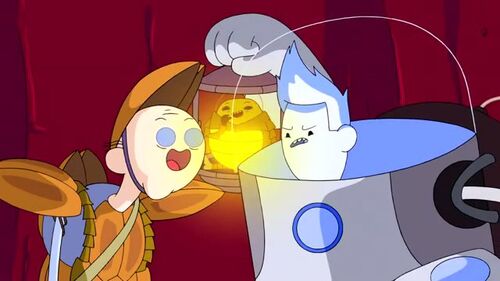 |
| "You think you're going to have that gorgeous blonde hair forever? Awww, that's adorable." |
We have to accept baldness as something that was always going to happen when your maternal grandfather was bald and your father is bald, and that it's okay we're getting older.
Because that means we can stay up late as we want and love the things we love without irony. We just have to pay the rent or save a planet from certain destruction as well.
No biggie.
References:
No biggie.
References:
Bravest Warriors Wiki - Holo John
Questionable Content #56
Bravest Warriors Wiki - Ultra Wankershim
What everybody gets wrong about Alanis Morissette's "Ironic"
Bacon Today
Bacolicious
Bacon by Fargginay
5 Reasons Bacon is Awesome
6 Reasons Bacon is Better than True Love
Scott Pilgrim is an Epic for the Nintendo Generation
xkcd - Grownups
No comments:
Post a Comment